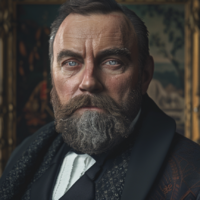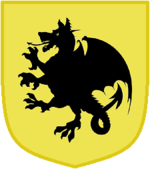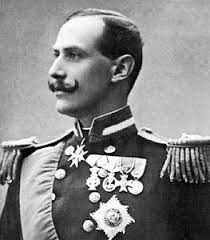Arthur III: Difference between revisions
No edit summary |
No edit summary |
||
| (17 intermediate revisions by 4 users not shown) | |||
| Line 2: | Line 2: | ||
{{Infobox Prince of the Calbain | {{Infobox Prince of the Calbain | ||
|name = Arthur III | |name = Arthur III | ||
|photo = File:Arthur III.png | |photo = File:Arthur III old.png | ||
|reign = | |reign = 1690–1730 | ||
|preceded = [[Jack II]] | |preceded = [[Jack II]] | ||
|succeeded = | |succeeded = [[Deiniol]] | ||
|primeministers = [[Richard ab Ioan]] | |primeministers = [[Richard ab Ioan]]<br>[[Cadwaladr Bevan-Hall]]<br>[[George Merwyn]]<br>[[Cedrick Eynon]]<br>[[Hugo Lewis-Dreicdyn]] | ||
|consort = Eirian ab Harwyn | |consort = Eirian ab Harwyn | ||
|issue = Llywelyn Jack Charles | |issue = [[Llywelyn of Pentyre|Llywelyn Jack Charles]] <small>(died 1712)</small><br>Ida Lysanna | ||
|fullname = Arthur Owain James Sherrinford-de Montfort | |fullname = Arthur Owain James Sherrinford-de Montfort | ||
|father = Prince Jack II | |father = Prince [[Jack II]] | ||
|mother = Lysanna Griffith | |mother = Lysanna Griffith | ||
|dob = VI.1645 | |dob = VI.1645 | ||
|dobplace = Pentyre, [[Calbion]] | |dobplace = [[Pentyre]], [[Calbion]] | ||
|dod = | |dod = 16.XIII.1730 | ||
|dodplace = | |dodplace = [[Pentyre]], [[Calbion]] | ||
}} | }} | ||
'''Arthur Owain James''', also known under his regnal name '''Arthur III''' | |||
'''Arthur Owain James Sherrinford-de Montfort''', also known under his regnal name '''Arthur III''' was the [[Prince of the Calbain]] from 1690 until his death in 1730. Arthur was the only son of [[Jack II|Prince Jack II]] of [[Calbion]]. | |||
In {{AN|1717}}, at the signing ceremony of the [[Treaty between Calbion and Kurum Ash-Sharqia]], he was offered the Grand Cordon in the [[Order of As-Saif]]. | |||
==Early Years== | ==Early Years== | ||
| Line 25: | Line 28: | ||
==Rule== | ==Rule== | ||
Following the death of his father, Arthur became Prince of the Calbain and was invested in an ancient ceremony in the Catodral of Pentyre. Arthur's first decade as Prince was characterised by his withdrawal from the political arena. During the tumultuous political fights of the 1680s and 1690s, the Prince positioned himself as the non-political symbol of the Calbain people. This gained him significant popularity among the people. | [[File:Prince Arthur III.jpg|thumb|left|Official Portrait of Prince Arthur III upon the assumption of his reign]]Following the death of his father, Arthur became Prince of the Calbain and was invested in an ancient ceremony in the Catodral of Pentyre. Arthur's first decade as Prince was characterised by his withdrawal from the political arena. During the tumultuous political fights of the 1680s and 1690s, the Prince positioned himself as the non-political symbol of the Calbain people. This gained him significant popularity among the people. Arthur has two children, [[Llywelyn of Pentyre]], who passed away in 1712, and Ida Lysanna. | ||
Following the death of Llywelyn, Arthur withdrew from politics. In the early years of the wave of terrorism that captured Calbion following 1712, it was rumoured that the Prince had sympathy for the insurgent Gwarcheidwaid y Genedl Bur, or the "Guardians of the Pure Nation", as they wished to turn Calbion into an absolute monarchy, led by the Prince. This led the emergency government of [[Cedrick Eynon]] to pressure the Prince into withdrawing fully from public life. | |||
== Death and succession == | |||
On 16.VIII.1730, Prince Arthur was found hanged from the ceiling in his private bathroom. He left a suicide note saying, "I'm hereby announcing my withdrawal from Micras" written by his own hand. The apparent suicide shocked the nation, but it lately transpired that Arthur lately had suffered from the onset of dementia and was prone to severe mood swings. | |||
After Prince Arthur's only son, [[Llywelyn of Pentyre|Llywelyn]], died, the line of princes from the house of Sherrinford de Montfort would be extinct following Arthur's own demise. The closest male-line relative eligible to succeed was upon Arthur's death the 32-year old [[Daniel Verion de Montfort]], a Knight of the Holy Lakes and a [[Hurmu]] socialite and junior scholar at the University of Huyenkula. Upon succeeding to the throne, Daniel took the regnal name [[Deiniol]] to show his loyalty to his new Calbain country. | |||
{{start box}} | |||
{{succession box|title=[[Prince of the Calbain]]|before=[[Jack II]]|after=[[Deiniol]]|years=1690–1730}} | |||
{{end box}} | |||
[[Category: | [[Category:Order of As-Saif]] | ||
Latest revision as of 19:09, 10 November 2024
| Arthur III | |
| Prince of the Calbain | |

| |
| Reign | 1690–1730 |
| Predecessor | Jack II |
| Successor | Deiniol |
| Governor-Generals | Richard ab Ioan Cadwaladr Bevan-Hall George Merwyn Cedrick Eynon Hugo Lewis-Dreicdyn
|
| Consort | Eirian ab Harwyn |
| Issue | Llywelyn Jack Charles (died 1712) Ida Lysanna
|
| Name | Arthur Owain James Sherrinford-de Montfort |
| Father | Prince Jack II |
| Mother | Lysanna Griffith |
| Born | VI.1645 |
| Pentyre, Calbion | |
| Died | 16.XIII.1730 |
| Pentyre, Calbion | |
| Prince of the Calbain | |

| |
| Owain | |
|---|---|
| Llywelyn I | |
| Arthur I | |
| Llywelyn II | |
| Arthur II | |
| Laclan | |
| Dawydd | |
| Jack I | |
| Jack II | |
| Arthur III | |
| Deiniol | |
| Jack III | |
Arthur Owain James Sherrinford-de Montfort, also known under his regnal name Arthur III was the Prince of the Calbain from 1690 until his death in 1730. Arthur was the only son of Prince Jack II of Calbion.
In 1717 AN, at the signing ceremony of the Treaty between Calbion and Kurum Ash-Sharqia, he was offered the Grand Cordon in the Order of As-Saif.
Early Years
Born in 1645, Arthur was the longest heir-in-waiting in Calbain history. Some years after his birth, a political discussion arose on the issue of Male-preference primogeniture. The Nationalist faction of Llywelyn Lewis, supposedly on behalf of Prince Jack himself, advocated for a move toward agnatic primogeniture. However, the Euran War, Jingdaoese occupation and subsequent exile of the Calbain government meant that the law of Princely descend did not change. Arthur's oldest sister, Brienne Alexandra, the Duchess of Kilkelly, has claimed on several occasions to have no interest in challenging her younger brother's claim to the throne.
Rule
Following the death of his father, Arthur became Prince of the Calbain and was invested in an ancient ceremony in the Catodral of Pentyre. Arthur's first decade as Prince was characterised by his withdrawal from the political arena. During the tumultuous political fights of the 1680s and 1690s, the Prince positioned himself as the non-political symbol of the Calbain people. This gained him significant popularity among the people. Arthur has two children, Llywelyn of Pentyre, who passed away in 1712, and Ida Lysanna.
Following the death of Llywelyn, Arthur withdrew from politics. In the early years of the wave of terrorism that captured Calbion following 1712, it was rumoured that the Prince had sympathy for the insurgent Gwarcheidwaid y Genedl Bur, or the "Guardians of the Pure Nation", as they wished to turn Calbion into an absolute monarchy, led by the Prince. This led the emergency government of Cedrick Eynon to pressure the Prince into withdrawing fully from public life.
Death and succession
On 16.VIII.1730, Prince Arthur was found hanged from the ceiling in his private bathroom. He left a suicide note saying, "I'm hereby announcing my withdrawal from Micras" written by his own hand. The apparent suicide shocked the nation, but it lately transpired that Arthur lately had suffered from the onset of dementia and was prone to severe mood swings.
After Prince Arthur's only son, Llywelyn, died, the line of princes from the house of Sherrinford de Montfort would be extinct following Arthur's own demise. The closest male-line relative eligible to succeed was upon Arthur's death the 32-year old Daniel Verion de Montfort, a Knight of the Holy Lakes and a Hurmu socialite and junior scholar at the University of Huyenkula. Upon succeeding to the throne, Daniel took the regnal name Deiniol to show his loyalty to his new Calbain country.
| Preceded by: Jack II |
Prince of the Calbain 1690–1730 |
Succeeded by Deiniol |
